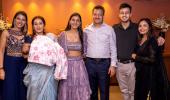Twins Rahin and Riba Hafezji chose books over social media and scored identical marks in their MBBS final exam.

It is quite unusual for a Gen Z-er not to not have an Instagram or Facebook account.
Except, of course, if you are aiming to top the study stream of your choice.
That's exactly what 24-year-old twins Rahim and Riba Hafezji did when they decided they wanted to become doctors.
The achievement of their dream came with another surprise. The sisters, who study at the Gujarat Medical Education and Research Society College in Vadodara, scored identical marks -- 935, which translates to 66.8 per cent.
Asked why they never used Instagram or Facebook, Riba says, "I didn't want to waste my time on useless things. One cannot concentrate on studies as ample time gets consumed by such platforms."
Rahin agrees.
Do they feel their life is boring because they are not on social media. Rahin laughs, Those on social media certainly think so. We tell them life is not all about social media. There are many other hobbies that can be pursued. One can keep oneself entertained."
Rahin loves to crochet, paint, draw mehendi and do craftwork.
"Social media is overloaded with frivolous content," she says. "We read news websites to keep ourselves updated."
Isn't devoting all their time to studies boring? Rahin laughs, "We realise our life is boring only when someone points it out. We are engrossed in studies and, at the moment, that is only our enjoyment."
The sisters shared one phone between them until the second year of medical college.
"We spend most of our day together," says Rahin, "so we never felt the urge to have different phones."
"We have the same friends," says Riba. "If anyone wants to contact Rahin, they will know she is with me so why waste money on another phone?"

Riba and Rahin say they learnt about saving at an early age after their parents separated. Life, they realised, would never be a bed of roses. Every paisa saved was a paisa earned.
"Our mother worked in a primary school and we knew her resources were limited. We had supportive maternal grandparents but, even as children, we could see her struggle and did not ask her for things," says Riba.
"You could say," smiles Rahin, "that we were very obedient children."
Who are their ideals in life? Pat comes the answer -- their mother Gulshad Hafezji, their maternal grandfather Advocate Bakhtiyar Ahmed Natalwala and their maternal grandmother Shamim Natalwala.

Riba plans to study for an MD in medicine; Rahin wants to specialise in surgery.
Did they always want to become doctors? "Yes," says Rahin. "We had one condition though," Riba adds, "we would pursue our medical studies only if we got government-aided seats. We knew our mother would not be able to pay hefty fees required for a medical education and that we could get admission through the government quota only if we scored good marks."
Riba scored 514 marks and Rahin 532 in NEET, ensuring they secured admission at the Gujarat Medical Education and Research Society College.
What advice would she give those who want to study medicine? "First of all, trust God," says Rahin. "Whenever you get demotivated, you have to believe there is Someone looking after you. Aazmata hai Khuda, le kar ya de kar (God will test you by taking away things away from you or giving things to you). Just be patient."
"Rattafication (rote learning) will not make you a doctor," adds Riba. "You have to work hard. Dedication is a must."
"In my case, mathematics helped me become a doctor. It taught me how to solve doubts and honed my analytical skills. This became ingrained in my mind very early in my life as a student."











